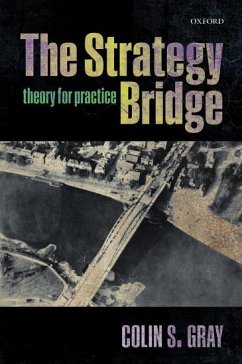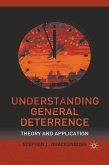The Strategy Bridge: Theory for Practice is an original contribution to the general theory of strategy. While heavily indebted to Carl von Clausewitz, Sun-tzu, and the very few other classic authors, this book presents the theory, rather than merely comments on the theory as developed by others. The author explains that the purpose of strategy is to connect purposefully politics and policy with the instruments they must use. The primary focus of attention is
on military strategy, but this focus is well nested in discussion of grand strategy, for which military strategy is only one strand.
The book presents the general theory of strategy comprehensively and explains the utility of this general theory for the particular strategies that strategists need to develop in order to meet their historically unique challenges. The book argues that strategy's general theory provides essential education for practicing strategists at all times and in all circumstances. As general theory, The Strategy Bridge is as relevant to understanding strategic behaviour in the Peloponnesian War
as it is for the conflicts of the twenty-first century.
The book proceeds from exposition of general strategic theory, to address three basic issue areas that are not at all well explained, let alone understood with a view to advancing better practice, in the extant literature. Specifically, the book tackles the problems that harass and imperil strategic performance; it probes deeply into the hugely underexamined subject of just what it is that the strategist produces-strategic effect; and it 'joins up the dots' from theory through practice to
consequences by means of a close examination of command performance.
The author takes a holistic view of strategy, and it is rigorously attentive to the significance of the contexts within which and for which strategies are developed and applied. The book regards the strategist as a hero, charged with the feasible, but awesomely difficult, task of converting the threat and use of force (for military strategy) into desired political consequences. He seeks some control over the rival or enemy via strategic effect, the instrumental produce of his instrumental
labours. In order to maximise his prospects for success, the practicing strategist requires all the educational assistance that strategic theory can provide.
Hinweis: Dieser Artikel kann nur an eine deutsche Lieferadresse ausgeliefert werden.
on military strategy, but this focus is well nested in discussion of grand strategy, for which military strategy is only one strand.
The book presents the general theory of strategy comprehensively and explains the utility of this general theory for the particular strategies that strategists need to develop in order to meet their historically unique challenges. The book argues that strategy's general theory provides essential education for practicing strategists at all times and in all circumstances. As general theory, The Strategy Bridge is as relevant to understanding strategic behaviour in the Peloponnesian War
as it is for the conflicts of the twenty-first century.
The book proceeds from exposition of general strategic theory, to address three basic issue areas that are not at all well explained, let alone understood with a view to advancing better practice, in the extant literature. Specifically, the book tackles the problems that harass and imperil strategic performance; it probes deeply into the hugely underexamined subject of just what it is that the strategist produces-strategic effect; and it 'joins up the dots' from theory through practice to
consequences by means of a close examination of command performance.
The author takes a holistic view of strategy, and it is rigorously attentive to the significance of the contexts within which and for which strategies are developed and applied. The book regards the strategist as a hero, charged with the feasible, but awesomely difficult, task of converting the threat and use of force (for military strategy) into desired political consequences. He seeks some control over the rival or enemy via strategic effect, the instrumental produce of his instrumental
labours. In order to maximise his prospects for success, the practicing strategist requires all the educational assistance that strategic theory can provide.
Hinweis: Dieser Artikel kann nur an eine deutsche Lieferadresse ausgeliefert werden.








